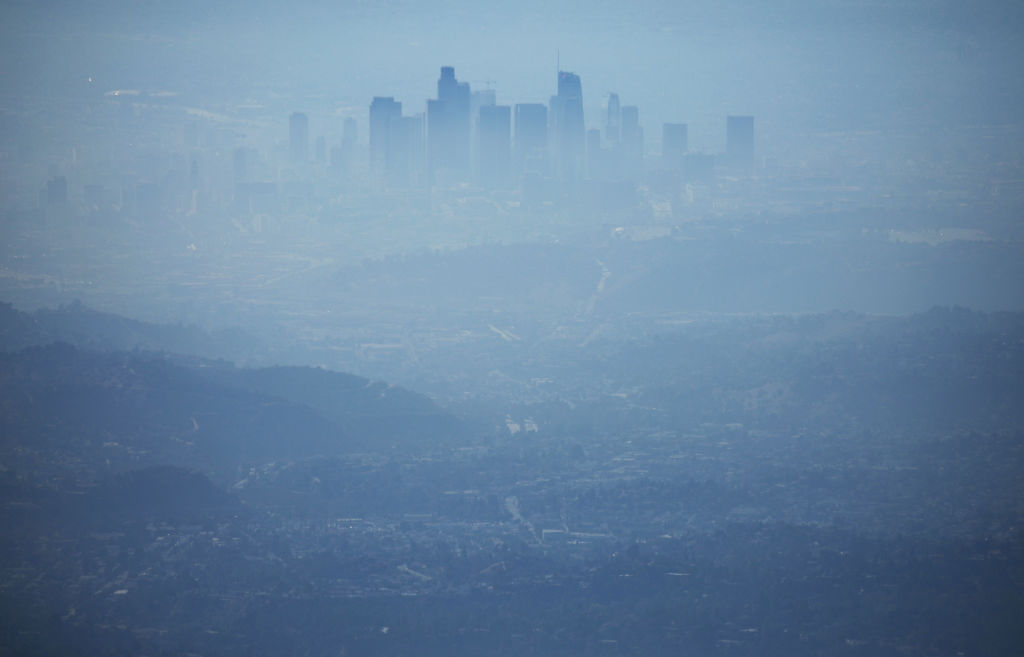Latest News
Environmental Report Indicts California Watchdog Agencies
A new study identifies the state’s worst regulatory agencies responsible for food safety and agriculture, air quality and toxic wastes.

Though several state agencies are getting better at administering policies to protect California’s low income populations and communities of color from environmental degradation, many still leave much room for improvement. That’s the main takeaway from the latest Environmental Justice Agency Assessment by the California Environmental Justice Alliance (CEJA), a community-led advocacy organization, which identified the agencies responsible for food safety and agriculture, air quality and toxic wastes as the state’s worst performers.
Indeed, while environmental justice has “risen in prominence” in Sacramento in recent years, said Ingrid Brostrom, the Center on Race, Poverty & the Environment assistant director and co-author of the report, “when you go to the different communities that have been harmed over the years by pollution, by disproportionate impacts, and by agency action and inaction, the improvements aren’t yet being felt on the ground.”
The worst grade—a D-minus—went to the California Department of Food and Agriculture, which is tasked with food safety and promoting the agricultural industry.
The report, the Alliance’s fourth, focuses primarily on eight state agencies, grading them on an A-D scale—with F for fail—according to basic principles of environmental justice. California’s Strategic Growth Council (SGC), which oversees multi-agency efforts surrounding economic and quality of life issues, received the report’s sole A grade, an A-minus.
The worst grade—a D-minus—went to the California Department of Food and Agriculture (CDFA), tasked with food safety and promoting the agricultural industry. The department’s environmental justice shortcomings mean that it has historically lacked “effective and meaningful engagement with communities of color, and communities that are burdened by agricultural pollution,” according to the report.
The 2017 Farmer Equity Act has benefited socially disadvantaged farmers, providing them with better access to technical assistance grants, the report favorably notes. At the same time, the authors are highly critical of the department’s continued support of a dairy digester program, casting doubt over the program’s greenhouse gas emissions accounting while arguing that it encourages further dairy industry consolidation.
In an email statement to Capital & Main, the department touted its 2018 hiring of a Farm Equity Adviser, along with its Spanish-language outreach efforts. “The California Department of Food and Agriculture is committed to justice and equity in all aspects of its operations,” the statement read.
The California Air Resources Board (CARB), the state agency responsible for regulating air quality and developing policies to tackle climate change, also received a D grade. CARB’s poor showing, the report finds, is in large part a result of its failure to require individual air districts to make “tangible” air emission reductions in badly polluted areas during its implementation of AB 617, a state bill designed to improve community air quality standards.
“They have the power to do a lot of things,” Neena Mohan, the Alliance’s Climate Justice Program associate, said of CARB’s regulatory leverage. “Just oftentimes it’s not exercised.”
The Department of Toxic Substances Control’s funding deficits, which shift the financial burden from the polluters onto the taxpayers’ shoulders, is a “significant failure,” the report states.
According to David Clegern, a CARB spokesperson, while the needs of disadvantaged communities are an agency priority, “We agree environmental justice is urgent and that more must be done to address the disproportionate environmental impact on California’s most vulnerable communities.”
* * *
A long history of organizational failures has meant that the Department of Toxic Substances Control (DTSC), responsible for protecting Californians from exposure to toxic wastes, has fostered “community distrust” towards the agency, the report finds. The department’s funding deficits, which shift the financial burden from the polluters onto the taxpayers’ shoulders, is a “significant failure,” the report states, while it also highlights ongoing efforts in Sacramento for a major agency overhaul.
Meredith Williams, the DTSC director, pointed to Gov. Newsom’s proposed reform plan, including a new oversight board. “These reform proposals will set the department up for long-term success, and allow us to meet the changing needs of our state as we work to protect the people and environment of California from toxic harm,” she wrote in an email.
In handing the SGC an A-minus, the report lauds the agency’s approach to community engagement, highlighting a research summit it held to foster stronger relationships among government officials, academics, community-based organizations and residents. The SGC serves as a model “that other state agencies and departments should follow,” the report finds.
The continued fallout from the coronavirus pandemic will make pollution prevention efforts within disadvantaged communities—those hit hardest by the disease—especially important, warned Brostrom. She is concerned that companies will push deregulation on grounds of economic hardship at the same time pollution has been known to exacerbate COVID-19. That sort of inequity is what “environmental justice has been combating forever,” she said.
Copyright 2020 Capital & Main

-

 The SlickJanuary 27, 2026
The SlickJanuary 27, 2026The One Big Beautiful Prediction: The Energy Transition Is Still Alive
-

 Column - State of InequalityJanuary 29, 2026
Column - State of InequalityJanuary 29, 2026Are California’s Billionaires Crying Wolf?
-

 Latest NewsFebruary 3, 2026
Latest NewsFebruary 3, 2026Amid the Violent Minnesota Raids, ICE Arrests Over 100 Refugees, Ships Many to Texas
-

 Dirty MoneyJanuary 30, 2026
Dirty MoneyJanuary 30, 2026Amid Climate Crisis, Insurers’ Increased Use of AI Raises Concern For Policyholders
-

 Featured VideoFebruary 4, 2026
Featured VideoFebruary 4, 2026Protesters Turn to Economic Disruption to Fight ICE
-

 The SlickFebruary 2, 2026
The SlickFebruary 2, 2026Colorado May Ask Big Oil to Leave Millions of Dollars in the Ground
-

 Column - State of InequalityFebruary 5, 2026
Column - State of InequalityFebruary 5, 2026Lawsuits Push Back on Trump’s Attack on Child Care
-

 Column - California UncoveredFebruary 6, 2026
Column - California UncoveredFebruary 6, 2026What It’s Like On the Front Line as Health Care Cuts Start to Hit

